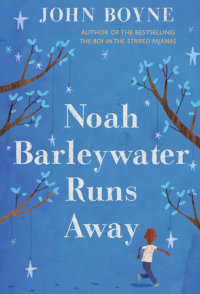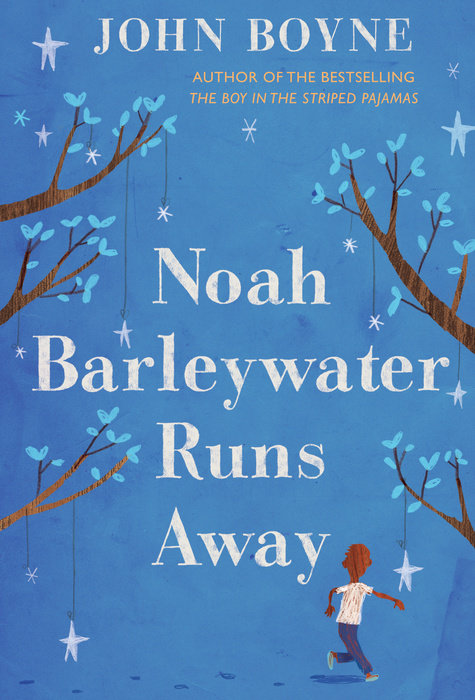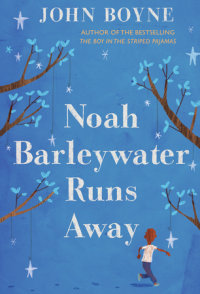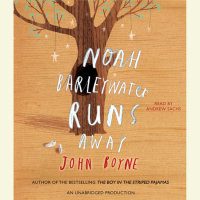Noah Barleywater Runs Away
Eight-year-old Noah's problems seem easier to deal with if he doesn't think about them. So he runs away, taking an untrodden path through the forest.
Before long, he comes across a shop. But this is no ordinary shop: it's a toyshop, full of the most amazing toys, and brimming with the most wonderful magic. And here Noah meets a very unusual toymaker. The toymaker has a story to tell, and it's a story of adventure and wonder and broken promises. He takes Noah on a journey. A journey that will change his life.
An Excerpt fromNoah Barleywater Runs Away
Noah Barleywater left home in the early morning, before the sun rose, before the dogs woke, before the dew stopped falling on the fields.
He climbed out of bed and shuffled into the clothes he’d laid out the night before, holding his breath as he crept quietly downstairs. Three of the steps had a loud creak in them where the wood didn’t knit together correctly so he walked very softly on each one, desperate to make as little noise as possible.
In the hallway he took his coat off the hook but didn’t put his shoes on until he had already left the house. He walked down the laneway, opened the gate, went through and closed it again, treading as lightly as he could in case his parents heard the sound of the gravel crunching beneath his feet and came downstairs to investigate.
It was still dark at this hour and Noah had to squint to make out the road that twisted and turned up ahead. The growing light would allow him to sense any danger that might be lurking in the shadows. When he got to the end of the first quarter-mile, at just that point where he could turn round one last time and still make out his home in the distance, he stared at the smoke rising from the chimney that stretched upwards from the kitchen fireplace and thought of his family inside, all safely tucked up in their beds, unaware that he was leaving them for ever. And despite himself, he felt a little sad.
Am I doing the right thing? he wondered, a great blanket of happy memories trying to break through and smother the fresher, sadder ones.
But he had no choice. He couldn’t bear to stay any longer. No one could blame him for that, surely. Anyway, it was probably best that he went out to make his own way in the world. After all, he was already eight years old and the truth was, he hadn’t really done anything with his life so far.
A boy in his class, Charlie Charlton, had appeared in the local newspaper when he was only seven, because the Queen had come to open a day centre for all the grannies and granddads in the village, and he had been chosen to hand her a bunch of flowers and say, We’re SO delighted you could make the journey, ma’am. A photograph had been taken where Charlie was grinning like the Cheshire cat as he presented the bouquet, and the Queen wore an expression that suggested she had smelled something funny but was far too well-brought-up to comment on it; he’d seen that expression on the Queen’s face before and it always made him giggle. The photo had been placed on the school notice board the following day and had remained there until someone – not Noah – had drawn a moustache on Her Majesty’s face and written some rude words in a speech bubble coming out of her mouth that nearly gave the headmaster, Mr Tushingham, a stroke.
The whole thing had caused a terrible scandal, but at least Charlie Charlton had got his face in the papers and been the toast of the schoolyard for a few days. What had Noah ever done with his life to compare with that? Nothing. Why, only a few days before he’d tried to make a list of all his achievements, and this is what he’d come up with:
1. I have read fourteen books from cover to cover.
2. I won the bronze medal in the 500 metres at Sports Day last year and would have won silver if Breiffni O’Neill hadn’t jumped the gun and got a head start.
3. I know the capital of Portugal. (It’s Lisbon.)
4. I may be small for my age but I’m the seventh cleverest boy in my class.
5. I am an excellent speller.
Five achievements at eight years of age, he thought at the time, shaking his head and pressing the tip of his pencil to his tongue even though his teacher, Miss Bright, screamed whenever anyone did that and said they would get lead poisoning. That’s one achievement for every . . . He thought about it and did a series of quick calculations on a bit of scrap paper. One achievement for every one year, seven months and six days. Not very impressive at all.
He tried to tell himself that this was the reason he was leaving home, because it seemed a lot more adventurous than the real reason, which was something he didn’t want to think about. Not this early in the morning, anyway.
And so here he was, out on his own, a young soldier on his way to battle. He turned round, thinking to himself, That’s it! I’ll never see that house again now! and continued on his way, strolling along with the air of a man who knows that, come the next election, there’s every chance he will be elected mayor. It was important to look confident – he realized that very early on. After all, there was a terrible tendency among adults to look at children travelling alone as if they were planning a crime of some sort. None of them ever thought that it might just be a young chap on his way to see the world and have a great adventure. They were so small-minded, grown-ups. That was one of their many problems.



